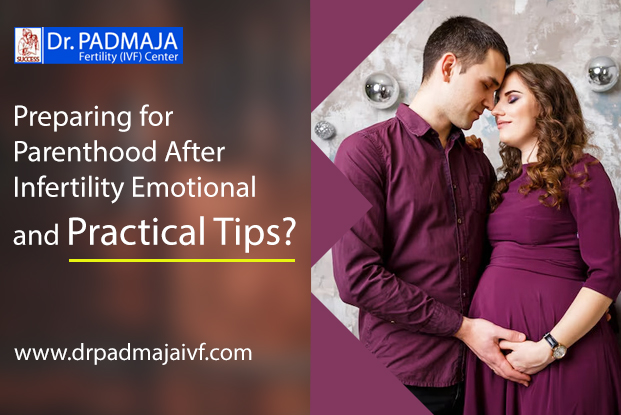Becoming a parent is a journey filled with joy, anticipation, and sometimes heartache. For couples who have faced infertility, this journey can be even more complex. If you’re on the brink of parenthood after infertility treatments, particularly IVF, it’s essential to prepare both emotionally and practically. This blog offers valuable insights and tips to help you navigate this transition, featuring references to the best IVF centers in Hyderabad, such as Dr. Padmaja IVF Center.
Embracing the Emotional Journey
Acknowledge Your Feelings
After enduring the emotional rollercoaster of infertility, it’s normal to feel a mix of excitement, anxiety, and even fear about becoming a parent. Acknowledge these feelings; they are a valid part of your journey. Therapy or support groups can be helpful, providing a safe space to share your experiences. Many find comfort in connecting with others who have gone through similar struggles, which can foster a sense of community and understanding.
Celebrate the Milestones
If you’ve successfully conceived after IVF, celebrate this incredible achievement! Each milestone—be it the first heartbeat, the first ultrasound, or feeling your baby kick—deserves recognition. Take the time to celebrate these moments with your partner, friends, and family. This not only enhances your emotional well-being but also strengthens your bond as you prepare for parenthood together.
Create a Vision
Spend some time visualizing your future as parents. Consider what kind of family life you want to create. Write down your hopes and dreams for your child, and think about the values you want to instill. This exercise can help clarify your expectations and reduce anxiety about the unknowns of parenthood.
Practical Preparations
Choose the Right Medical Support
Finding the right healthcare provider is crucial. For those who have undergone IVF at the best IVF center in Hyderabad, like Dr. Padmaja IVF Center, you might already have a trusted doctor by your side. Establish a plan with your fertility specialist regarding prenatal care. Continuity of care is essential for a smooth transition from infertility treatment to a healthy pregnancy.
Educate Yourself About Pregnancy and Parenthood
Knowledge is empowering. Take the time to educate yourself about pregnancy, childbirth, and early parenting. There are numerous resources available, from books and online courses to local parenting classes. Understanding what to expect can alleviate some fears and uncertainties. Many couples find it beneficial to attend prenatal classes together to bond over this shared experience.
Prepare Your Home
Your living space should be conducive to a new baby. Create a nursery or a dedicated space for the baby’s essentials. This includes setting up a crib, organizing baby clothes, and gathering necessary supplies like diapers and feeding items. Making your home ready can be an exciting and practical way to get into the parenting mindset.
Building a Support System
Communicate with Your Partner
Open communication with your partner is essential. Discuss your fears, expectations, and plans for parenting. Share your feelings and thoughts on how you can support each other through the transition. It’s crucial to maintain this dialogue as you navigate the ups and downs of parenthood.
Engage Family and Friends
Your support network can be invaluable. Don’t hesitate to lean on family and friends for help. Whether it’s babysitting, cooking meals, or just being there to listen, having a solid support system can ease the challenges of new parenthood. Let them know how they can help you best.
Consider Professional Support
If you’re struggling emotionally, consider seeking help from a therapist specializing in infertility or postpartum issues. Organizations like Dr. Padmaja Fertility Center often have resources and referrals available for mental health professionals who understand the unique challenges faced by those transitioning from infertility to parenthood.
Fostering Self-Care
Prioritize Your Health
Taking care of yourself is essential as you prepare for parenthood. Focus on maintaining a healthy diet, getting regular exercise, and ensuring you have enough rest. This not only prepares your body for pregnancy but also sets a positive example for your future child.
Practice Mindfulness and Stress Relief
Infertility and the subsequent transition to parenthood can be stressful. Incorporate mindfulness practices into your daily routine to help manage anxiety. Techniques such as meditation, yoga, or simple breathing exercises can help ground you during this busy time.
Conclusion
Preparing for parenthood after infertility is a multifaceted journey that requires emotional resilience and practical planning. By acknowledging your feelings, educating yourself, building a support network, and prioritizing self-care, you can pave the way for a smoother transition into this new chapter of life. If you’re in Hyderabad, seeking guidance from a reputable IVF center, such as Dr. Padmaja IVF Center, can further support your journey. Embrace this time as an opportunity to grow, learn, and ultimately enjoy the wonderful experience of becoming a parent. Remember, you’re not alone in this journey, and there are resources and communities ready to support you every step of the way.
About The Author :

If Dr. Padmaja Divakar is a public figure or a professional in a specific field, I recommend checking her official website, professional profiles, or reliable online sources for the most up-to-date and accurate information about her background, qualifications, and achievements.
Frequently Asked Questions (faqs)
1.How can I cope with anxiety about becoming a parent?
It’s important to acknowledge your anxiety. Techniques like mindfulness, deep breathing, and talking to others in similar situations can help.
2.Will I ever fully move on from my infertility experience?
Healing is a personal journey. Many people find that while the pain may lessen, the experience shapes their perspective on parenting.
3.How can I involve my partner in the preparation process?
Encourage your partner to participate in classes, attend doctor appointments, and discuss parenting goals together.
4.What if I experience postpartum issues after infertility?
Be aware that postpartum depression or anxiety can occur, regardless of your previous struggles. Seek help from professionals if you experience any symptoms.
5.Is it normal to feel disconnected from the pregnancy?
Yes, many people feel a disconnect after infertility. It’s important to recognize these feelings and talk about them with your partner or a professional.

